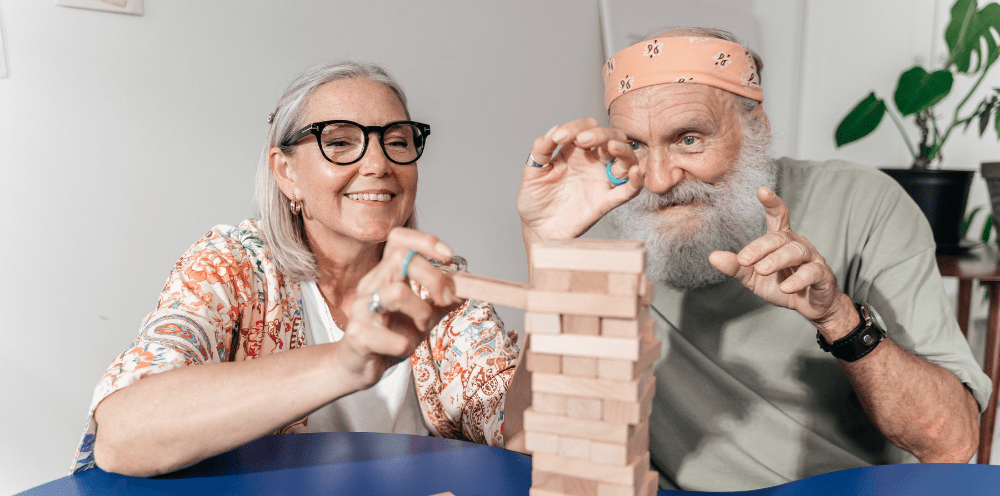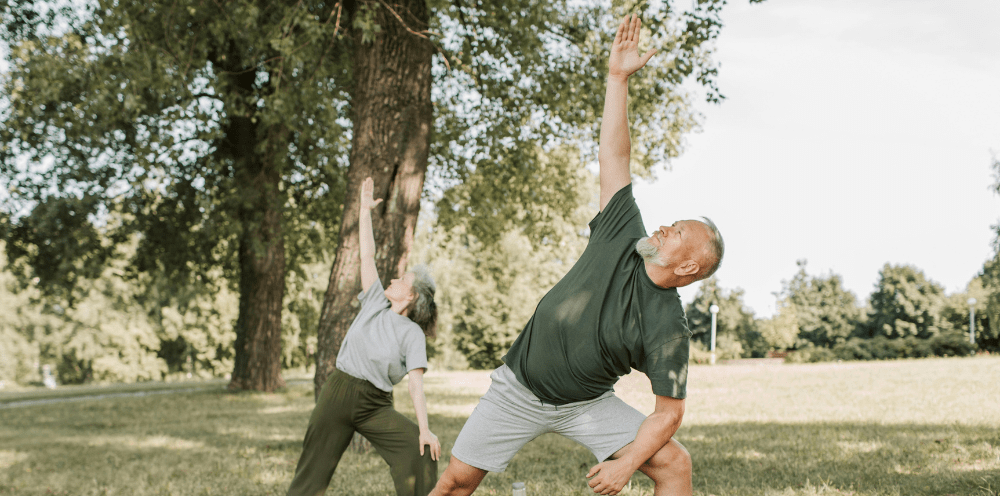The health of older people requires special care, especially when it comes to providing adequate nutrients. Vitamins play a key role in maintaining the proper functioning of the body, supporting immunity, bones, skin and also mental health. As we age, the body’s ability to absorb nutrients decreases, increasing the risk of deficiencies. Properly selected supplementation for seniors can significantly improve quality of life and prevent numerous ailments.
In this article, we take a look at which vitamins are particularly important for seniors, which supplements are worth considering and how Endotelio brand products can support seniors’ health.
Why are vitamins crucial for older people?

Vitamins play an important role in the functioning of the body at every stage of life, but in older age an adequate supply is particularly important. As we age, the metabolic rate changes and the body’s ability to absorb nutrients from the diet decreases. This can lead to vitamin deficiencies, which consequently weakens the immune system, bone health, the nervous system and the cardiovascular system.
Why are seniors at greater risk of vitamin deficiencies?
Reduced nutrient absorption: with age, the digestive system loses some of its ability to effectively absorb vitamins, such as vitamin B12.
Unilateral diet: older people often eat less variety in their meals, which can limit the supply of vitamins.
Diseases and medications: certain conditions (e.g. osteoporosis, diabetes) and medications used can affect vitamin metabolism.
Consequences of vitamin deficiency in seniors include:
- bone weakness (osteoporosis),
- cognitive disorders,
- chronic fatigue,
- increased susceptibility to infections.
The most important vitamins for seniors
Vitamins are an integral part of a healthy diet, especially in older age when the body becomes more susceptible to various types of illness. Their deficiency can lead to serious health consequences, so it is worth knowing which ones play a key role in maintaining health and how to supplement them. Here are five of the most important vitamins that seniors should especially include in their dietary and supplementation plan.
Vitamin D
Role in the body:
Vitamin D, often referred to as the ‘sunshine vitamin’, plays a key role in maintaining healthy bones and teeth. It assists in the absorption of calcium and phosphorus, which is essential for the building and regeneration of bone tissue. Vitamin D deficiency can lead to osteomalacia, a softening of the bones, resulting in an increased risk of fractures, which are difficult to treat in old age and involve a long period of rehabilitation. In addition, vitamin D supports the immune system, helping the body to fight infections, which is particularly important for older people.
Deficiency symptoms:
- Bone and back pain,
- Muscle weakness, which increases the risk of falls,
- Balance problems and difficulty moving.
How to supplement:
- Diet: Include fatty fish such as salmon, mackerel and sardines in your diet. Also reach for egg yolks and dairy products enriched with vitamin D.
- Dietary supplements: During autumn and winter, when access to sunlight is limited, vitamin D supplementation is almost essential. Seniors should consult their doctor about the dosage to avoid overdosing.
Vitamin B12
Role in the body:
Vitamin B12 is indispensable for the proper functioning of the nervous system and the production of red blood cells. Thanks to it, the body can prevent megaloblastic anaemia, which manifests itself in weakness, fatigue and difficulty concentrating. In addition, B12 plays an important role in metabolism, supporting energy production, which helps seniors to remain vital and active on a daily basis.
Deficiency symptoms:
Numbness and tingling in the limbs,
Problems with memory and concentration,
Pallor of the skin and reduced endurance to physical exertion.
How to supplement.
- Diet: The best sources of vitamin B12 are animal products such as meat, fish (e.g. cod or tuna), milk and milk products and eggs.
- Dietary supplements: Seniors who have difficulty absorbing vitamin B12 (e.g. due to atrophic gastritis) can turn to supplements in the form of tablets, capsules or injections.
Vitamin C
Role in the body:
Vitamin C is primarily known for its immune-supporting effects, but its functions go much further. As a powerful antioxidant, it protects cells from oxidative stress, slowing down the body’s ageing process. It also supports the health of blood vessels, preventing cardiovascular disease, which is common in older people.
Deficiency symptoms:
- Slowed wound healing,
- Bleeding gums,
- Increased susceptibility to infection.
How to supplement:
- Diet: Reach for fresh fruit and vegetables – especially citrus (oranges, grapefruit), peppers, kiwi, strawberries and green vegetables such as broccoli and spinach.
- Dietary supplements: May be helpful during periods of increased risk of infection, such as during colds.
Vitamin A
Role in the body:
Vitamin A is crucial for eye health. It protects against dry eye, reduces the risk of macular degeneration and other age-related diseases such as cataracts. In addition, vitamin A supports the immune system and helps maintain healthy skin and mucous membranes, which protects the body from infections.
Deficiency symptoms:
- Problems with vision after dark (known as night blindness),
- Dryness of the skin and mucous membranes,
- Increased susceptibility to respiratory infections.
How to supplement:
Diet: Enrich your meals with vegetables rich in beta-carotene, which the body converts into vitamin A. These include carrots, pumpkin, yams, and green leafy vegetables such as spinach and kale.
Vitamin E
Role in the body:
Vitamin E, often referred to as the ‘vitamin of youth’, is a powerful antioxidant that protects cells from oxidative stress damage. It supports skin health by maintaining its elasticity and delaying the ageing process. In addition, vitamin E helps maintain the normal functioning of the nervous system and prevents cardiovascular disease.
Deficiency symptoms:
- Muscle weakness,
- Motor coordination disorders,
- Dry skin and increased risk of infections.
How to supplement:
Diet: Nuts, seeds (e.g. sunflower), vegetable oils (rapeseed, sunflower) and green leafy vegetables such as spinach are good sources of vitamin E.
How to prevent vitamin deficiencies?

Seniors can effectively prevent vitamin deficiencies with the right strategies:
- Regular blood tests: They help detect vitamin deficiencies and indicate which dietary supplements are worth taking.
- A varied diet: It is important to consume whole foods from each food group.
- Avoiding processed foods: Highly processed foods are low in vitamins and minerals.
- Supporting with supplements: When the diet does not provide adequate amounts of vitamins, dietary supplements may be necessary.
Dietary supplements - are they necessary?

Dietary supplements become particularly important when seniors have difficulty supplementing vitamins through diet. It is worth remembering that supplements are not a substitute for a balanced diet, but they can be a valuable support in case of vitamin deficiencies.
When is it worth reaching for dietary supplements?
- In the event of vitamin D deficiency during the winter period,
- In the case of anaemia due to a lack of B12,
- After an illness that has weakened the body.
What should you consider when choosing dietary supplements?
- Consult your doctor or nutritionist for your choice,
- Check the composition and dosage of the vitamins,
- Avoid supplements with unnecessary additives.
Endotelio - innovative health support for seniors

Seniors often turn to dietary supplements to replenish vitamin and mineral deficiencies, especially when it is difficult to provide them from food alone. There are many formulations available on the market, however, Endotelio products are unique due to the presence of the 1-MNA molecule, which works at the cellular level to optimise NAD+ levels in the body. Here are a few selections that, thanks to their unique formulations, will be suitable for seniors:
Endotelio Cellular Energy – more energy every day
This supplement supports energy production at the cellular level thanks to ingredients such as 1-MNA, coenzyme Q10 and B vitamins. Endotelio Cellular Energy is the perfect solution for seniors struggling with lack of energy and fatigue.
Benefits:
- Increased energy levels.
- Support for heart health.
Endotelio Immune – putting immunity first
In addition to the key ingredient 1-MNA, Endotelio Immune contains ingredients that strengthen the immune system, such as vitamin C, vitamin D and histidine, which is an essential amino acid responsible for building proteins in the body.
Benefits:
- Strengthening of the body’s natural defence mechanisms.
- Improved functioning of the respiratory system.
Endotelio Brain – mental clarity and memory
Thanks to ginkgo biloba extract and B vitamins, Endotelio Brain supports cognitive function and improves memory. Ideal for seniors who want to take care of their intellectual abilities.
Benefits:
- Improved concentration.
- Slowing down brain ageing processes.
What are the effects of vitamin deficiencies?

Vitamin deficiencies can lead to a range of serious health problems that particularly affect seniors. Lack of key nutrients negatively affects many systems in the body: from weakened immunity to brain dysfunction. For example, a vitamin D deficiency results in weaker bones, increasing the risk of osteoporosis and fractures, while a lack of vitamin B12 leads to anaemia, memory problems and impaired concentration. Vitamin C deficiency can weaken the immune system, causing more frequent infections and slower wound healing, while a lack of vitamin A negatively affects vision, increasing the risk of cataracts and macular degeneration. In extreme cases, vitamin deficiencies can contribute to the development of chronic diseases such as heart disease and diabetes, which is why it is so important to ensure an adequate supply.
Frequently asked questions
Can seniors have an excess of vitamins?
Yes, excess vitamins, especially fat-soluble vitamins (A, D, E, K), can be toxic. It is important to follow dosage recommendations.Can vitamins prevent chronic diseases?
Vitamins support general health and can reduce the risk of certain diseases, such as osteoporosis or cataracts, but they are not a ‘cure’ for all ailments.What tests are worth doing to check vitamin levels?
It is best to do blood tests for levels of vitamin D, B12 and other key nutrients.Are all vitamins needed every day?
Some vitamins (such as B12) are stored in the body, so taking them daily is not necessary. Others, such as vitamin C, need to be supplied on an ongoing basis.
Conclusions and conclusion

Ensuring an adequate supply of vitamins is an investment in health and well-being in mature age. Seniors should pay particular attention to vitamins D, B12, C, A and E, which support bones, the immune system, vision and skin condition.
Remember that a balanced diet enriched with appropriate supplements, if needed, is key. Regular consultations with your doctor and blood tests will help you avoid vitamin deficiencies and excesses.
By taking care of proper supplementation, we can enjoy good health and activity for many years to come. It is therefore worth investing in a healthy lifestyle today!


